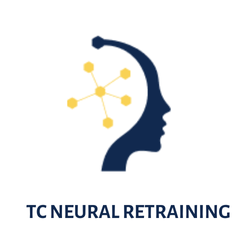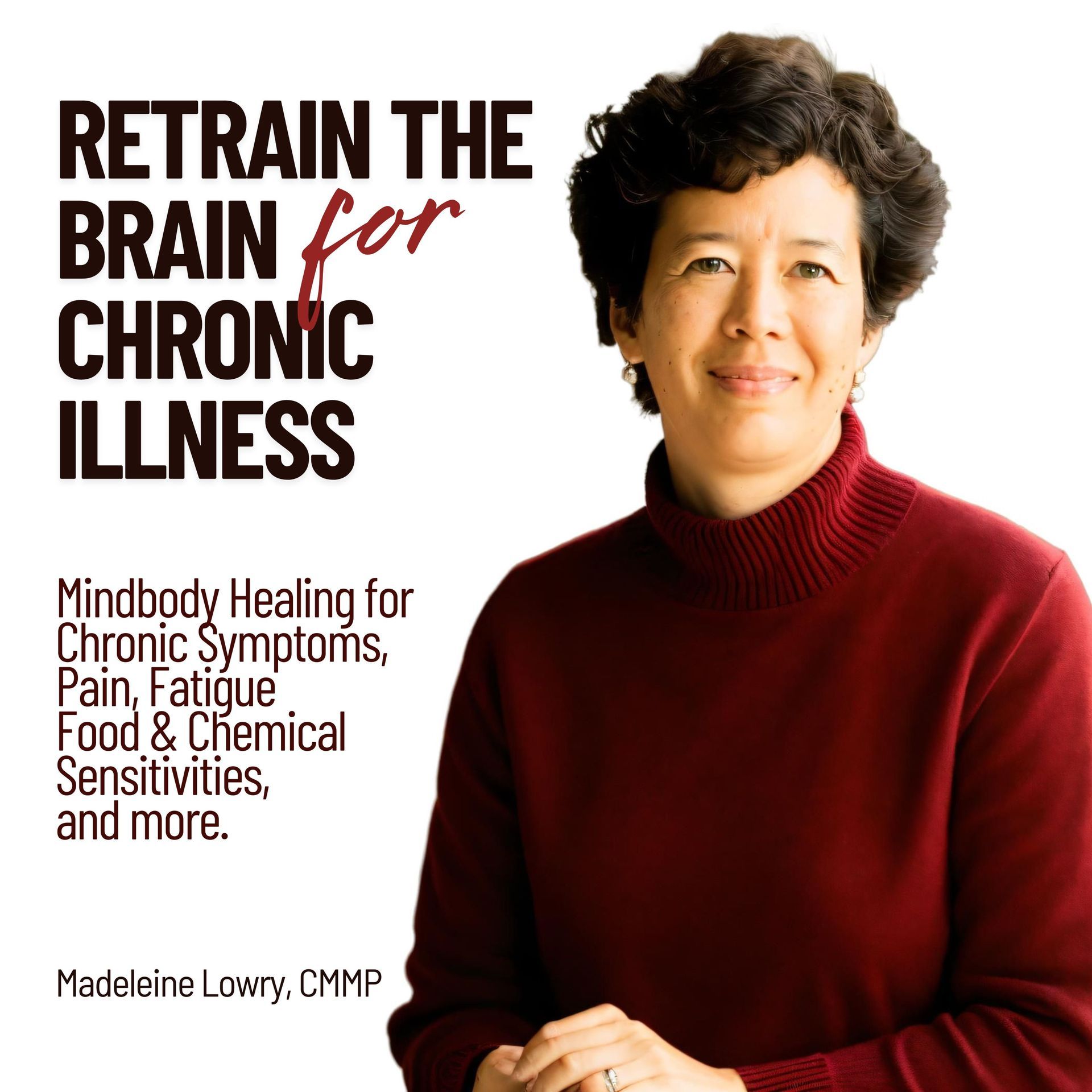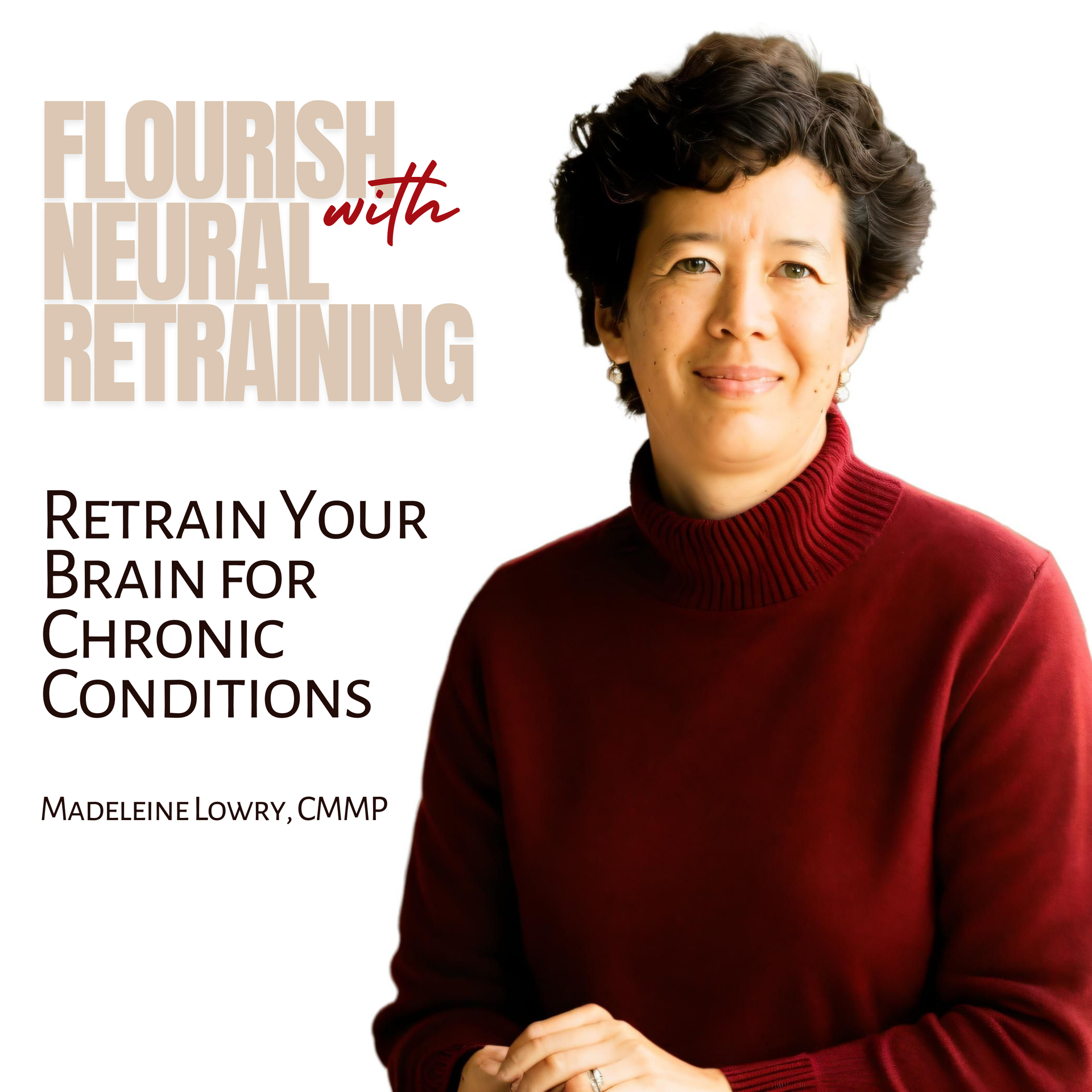How to Use Your Mind to Heal Your Body
Flourish with Neural Retraining Podcast, Episode 71 - A Listener's Guide
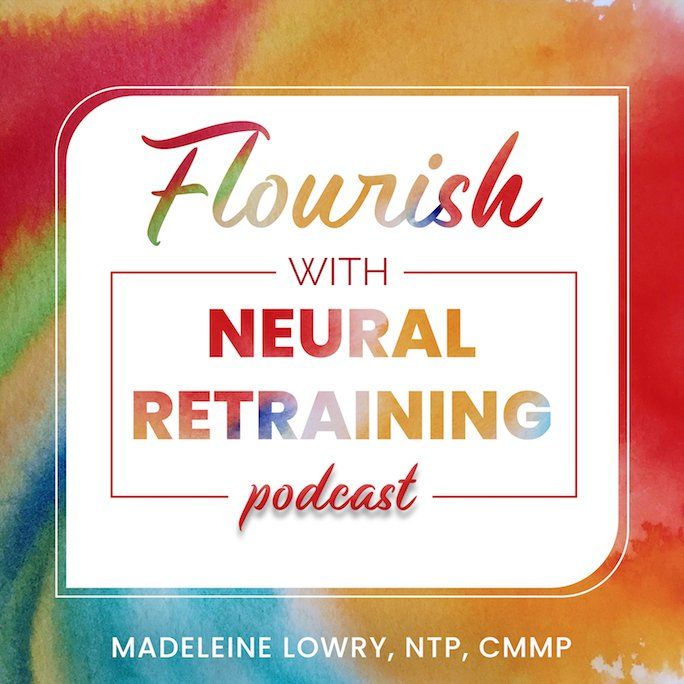
Listen to the podcast episode
In This Episode
- How use your mind to optimize healing.
- 7 ways you may be using your mind to prolong chronic health issues.
- Daily practices to promote wellness.
Show Notes
Join me for episode 71 where I will talk about how to use your mind to optimize the healing capacity of your body. These are practices that you can pursue on your own, outside of MAP sessions, that are complementary to MAP or any other form of neural retraining.
While MAP is a fast and gentle method of releasing emotions, changing patterns of negative thoughts, quieting the inner critic, changing beliefs and perspectives, and even changing patterns of behavior like people-pleasing -- there is more that you can do with your conscious mind.
In this episode I discuss:
- The role of stress and how it affects your healing capabilities.
- How stress blocks all restorative functions of the body
- 7 ways you could be using your mind to prolong chronic illness
- Conscious versus subconscious sources of stress.
- How MAP sessions can help with subconscious sources of stress and negative mental patterns.
- How the predisposition to chronic illness is often established in the subconscious mind by traumatic events in childhood.
- 10 ways to manage your conscious mind to promote healing
- Helpful practices you can incorporate into your day to optimize wellness.
If you enjoyed this episode, you may be interested in the related episodes that were mentioned: Episode 30:
The Impact of Trauma on Chronic Health Issues, Episode 52:
MAP for Painful Memories and Episode 60:
MAP for the Emotional Causes of Illness.
To learn more about the MAP Method, please visit
MAPforHealth.us for our free courses. To schedule an Introductory MAP session please book online at
TCNeuralRetraining.com.
Transcript
*Please note: Transcript generated by AI, accuracy not guaranteed.*
[music]
Welcome to the Flourish with Neural Retraining podcast. I'm your host, Madeleine Lowry, founder of Twin Cities Neural Retraining, and a certified MAP Method practitioner specializing in anxiety,
sensitivities, and chronic symptoms and conditions.
Join me for episode 71, where I will talk about how to use your mind to optimize the healing capacity of your body. These are practices that you can pursue outside of map sessions that are complementary to MAP or any other form of neural retraining. While MAP is a fast and gentle method of releasing emotions, changing patterns of negative thoughts, quieting the inner critic, changing beliefs and perspectives, and even changing patterns of behavior, like people pleasing, there is more that you can do with your conscious mind.
Believe me, I didn't know this at the beginning of my journey as a MAP practitioner, but after working with hundreds of clients in almost 2,000 MAP sessions, and observing how the mind works, I know that it is not all about the subconscious mind. Your conscious mind matters as well.
By the end of this podcast, I want you to appreciate that thoughts and emotions are things, and though they may seem small and ephemeral, they are powerful and set the stage for health or illness. So no matter what treatments or modalities you are currently using, knowing how to use your mind is essential to recovery, and for many it is the missing puzzle piece.
As always, we must disclaim that the information we share in the podcast is for educational purposes only. As MAP Method practitioners, we do not diagnose or treat disease. Instead, we work with the mind to optimize health.
Are you ready to learn more? Good. Let's get started.
Now, if you are listening to this podcast, you likely have a chronic symptom or illness, or have a loved one who does. And you also have a life, and you have thoughts and emotional reactions to what happens in your life, and to your own state of health.
The basic concept for optimizing our mind body for health is simple to understand. It is a state of no stress. It is a state of relaxation.
Why? Because stress activates the fight, flight, or freeze response. And in that state, all healing functions of the body are sacrificed to gear up for an emergency. This includes essential functions like digestion, elimination, detoxification, hormone balance, fluid balance, nutrient uptake, wound healing, and even immune regulation.
The way to maintain a state of stress and block all restorative functions of the body is to keep your mind focused on a threat. That threat could be an unpaid bill, a deadline at work, the upcoming visit by your mother-in-law, your illness, or all of the above.
To make the point clear, let's describe how you can use your mind to intensify and prolong chronic illness.
Number one, you resist your illness. You fight with it. Flee from it, or numb yourself out.
You have thoughts like, "Why is this happening to me? This is so unfair. My body is betraying me. How can I make this go away? How can I fix this? Nothing ever works for me. No one can help me. I'm running out of time." And these thoughts produce negative emotions like sadness, frustration, despair, and hopelessness.
Number two, your mind is stuck in the past, second-guessing some decision that you've made,
or the future, and the fears of an unwanted future.
Number three, you focus, overly focus on your current condition, the state of your body, your physical health, and your mind is caught in an endless loop of scanning the body for symptoms.
Number four, you research your condition, your prognosis, and all possible treatments,
and effects and side effects.
Number five, you worry and catastrophize incessantly--every decision that you make from diet to supplements to activities, exposures, decisions about treatment options, practitioners, and on and on.
Number six, you join groups on social media, or in real life that are focused around your illness,
and you participate in many discussions about your illness.
Number seven, you identify with your illness, you let it define you, and you talk, and you think about it all of the time.
Now the mental and emotional patterns I've just described create a perfect storm for chronic illness. I want you to recognize any of these in yourself, or in your loved one. These repetitive, negative thoughts and emotions are self-reinforcing, creating a vicious cycle that makes us feel trapped.
I want you to remember what I said before. The ideal condition for healing is a
state of no stress. That is a state of inner peace.
I know that is paradoxical. A state of inner peace evokes the rest, digest, and heal response, which is the mode of the autonomic nervous system where all healing occurs.
Let me say that another way: When we are stuck in a state of stress, no healing can happen.
Mental and emotional stress exists on two levels, the conscious and the unconscious. What I've just described is stress created in the conscious mind. This is stress that you can alleviate once you understand how to manage your mind.
The stress is in your subconscious mind, such as unresolved trauma, habitual negative responses to everyday events, and some of the personality traits, such as people pleasing, conflict-avoiding,
being the fixer, the chameleon, and so forth, are best resolved through MAP sessions.
I want to briefly mention that a predisposition to chronic illness is often established in the subconscious mind when we are very young by traumatic events and childhood, and then reinforced by stressors that lead up to the development of symptoms.
Relieving these sources of subconscious stress through MAP sessions can be a game-changer. If you are interested in learning more about how that works, please listen to episode 30 about the impact of trauma and chronic illness, and episode 52 about MAP for painful memories.
So, how do we manage our conscious mind to promote healing? Let's review a few strategies.
1. Be present. Focus on your current reality, and catch yourself when your mind is jumping to fears from the past or the future.
2. Peaceful acceptance of what is, including your state of health.
3. Trust that things will be okay.
4. Focus on what is good. Make happiness your priority.
5. Change the preoccupation with body scanning. Instead of searching for what is ailing you, search for parts of your body that feel good, that feel okay.
6. Incorporate activities that you love into each day.
7. Maintain a positive outlook and mood, or at least a neutral one.
8. Only think about or research actionable issues.
Make your decision, and then let it go.
9. Minimize time on social media, or information about your condition. And
10. Focus on your motivations for getting better, and what you hope to do in the future.
Now I know that this is easier said than done, but once you understand the broad outlines,
you can take it one step at a time. If any of this feels particularly daunting, MAP sessions may be helpful for releasing the negative emotions, changing the mental patterns like worrying and catastrophizing, as well as relieving the subconscious mind from unresolved trauma.
If you have a history of obsessive thinking patterns, if you have a history of an eating disorder, or
traits such as perfectionism, managing your conscious mind may be more challenging,
and MAP sessions may be helpful.
If you would like to learn more about psychoneuroimmunology, or the science of how our thoughts and emotions affect our nervous system and our immune system, listen to episode 60 where I talk about Dr. Candice Perth's work in this area.
As Dr. Neil Nathan has said, "Unresolved negative emotions related to past trauma are a drain on the body's energy." And when those emotions are fully processed through practices like EMDR or MAP sessions, that energy becomes available for healing. This is another important principle to understand.
So let me talk briefly about a few helpful practices you may want to incorporate into your daily life.
Mindfulness meditation is an important practice for anyone with chronic illness. The goal of mindfulness meditation is to increase your awareness of what is happening, what is going through your mind. When you are more aware of the thoughts that are occupying your mind,
then you will have more success in being able to manage them. So step one is really becoming more aware.
There are many mindfulness practices out there, but a very simple beginner exercise would be
to sit in a comfortable position, and focus on the breath for five to ten minutes. Every time your mind wanders, notice where it goes and label it, such as worrying or planning, trying to fix something in the past. Once you have labeled it, bring your mind back to your breath.
Every time you bring your focus back to your breath, you are strengthening your powers of awareness. This will enable you to start to feel a bit of separation between who you are and your thoughts and emotions. And as a result, you will be less likely to be overwhelmed by negative thoughts and emotions.
The second practice I would like to recommend is gratitude. You can do this by keeping a gratitude journal and writing about all the things that you are grateful for each day, or you can try this gratitude exercise in the moment. Anytime you are having negative emotions or negative thoughts, look around you and pick something to be grateful for. It could be a light bulb, a person, a cloud, or a tree. Think of five sincere reasons why you are grateful for this object. Take five to six slow, deep, relaxing breaths and connect deeply to the feeling of gratitude.
The third practice I would like to recommend is laughter and laughter yoga. Search the videos on YouTube about Dr. Medan Kataria's work and the laughter yoga clubs that he has created around the world and also online. I also suggest reading about Norman Cousins personal story of using laughter to overcome a very painful autoimmune condition in his book Anatomy of an Illness.
Now as I said in the introduction by the end of this podcast, I hope that you are able to appreciate that your thoughts and emotions are powerful and they have a powerful effect on your state of health. Knowing how to use your mind is essential to recovery.
And I hope that this discussion has been helpful and has given you some ideas about things that you can do gradually, over time, to change the landscape of your mind for optimal health.
Thanks for listening.
Thanks for joining us for the Flourish with Neural Retraining podcast. Please listen again and remember to follow us and leave a review on iTunes, Spotify, Amazon Music, Google Play or Stitcher.
Check out our free courses about the MAP Method, how it works, and how we use it for mind body healing at mapforhealth.us or schedule your introductory session at
mindremapforhealth.com.
Until the next time, be well and flourish.
Content of this podcast copyright 2023 by Twin Cities Neural Retraining, music by Barbara Benn.
[music]
Learn more
- Listen to more Flourish with Neural Retraining podcast episodes.
- Learn more about the MAP Method and How it Works
- Watch the Frequently Asked Questions videos.
- How the MAP Method effectively heals trauma.
- Check out our free course on the MAP Method and how it is used for mind-body healing
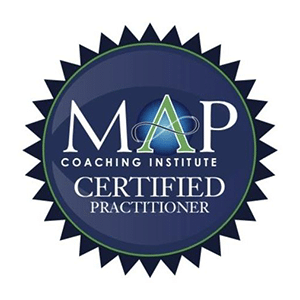

Madeleine Lowry, NTP, CMMP
Certfied MAP Method Practitioner
Madeleine specializes in neural retraining for chronic conditions. As a Nutritional Therapy Practitioner, she worked with many clients who were interested in eliminating allergies, sensitivities and intolerances. After learning a basic method and seeing its limitations, she trained in an advanced method of retraining the brain and now offers MAP sessions over Zoom and online self-paced programs for Anxiety/Depression, Sensitivities, Chronic Pain, Self-Healing, and COVID Long.
Related Posts

